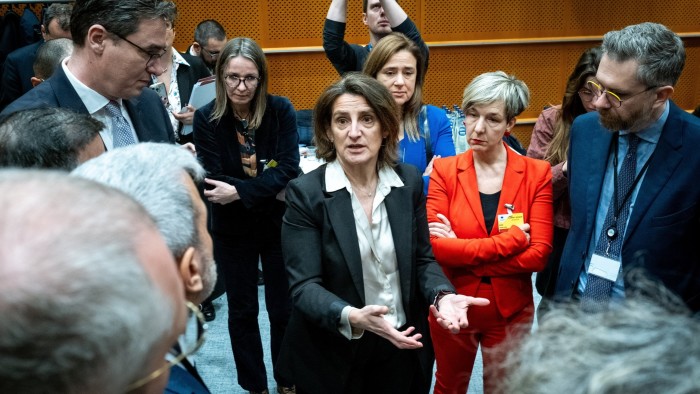Stay informed with free updates
Simply sign up to the EU business regulation myFT Digest — delivered directly to your inbox.
The EU’s antitrust chief Teresa Ribera is under pressure to set out her vision for competition policy, with frustrated officials and dealmakers pressing for more certainty over what could be the biggest overhaul of merger rules in decades.
Nine months after taking office with instructions to shake-up merger control to make way for “European champions”, the Spanish socialist has yet to indicate whether she will break significantly from the EU’s traditional antitrust approach.
The lack of clear direction has sown uncertainty over potential deals, according to industry executives and lawyers who are waiting for signs from Brussels before advising boardrooms on investment decisions.
It has also created tension with the team of European Commission president Ursula von der Leyen, who wants industrial policy to help the continent catch up with the US and China’s economic clout.
“Patience is running thin on the lack of clarity,” said one lawyer advising companies on mergers and acquisitions. Another said: “C-suites don’t have the patience to wait for the slow Brussels machine”.
Speaking to reporters at a conference in Florence on Friday, Ribera acknowledged the frustrations but stressed the need to follow a thorough consultation process on reforms.
“I understand the impatience,” she said, adding that she would “work as fast as possible” but also needed to “respect the need to make a proper assessment”.
When Ribera inherited the powerful competition portfolio from Margrethe Vestager, European capitals and executives alike expected it to herald a fundamental shift in EU merger control. Her formal appointment came shortly after Mario Draghi’s landmark report on EU competitiveness, when the former Italian premier and European Central Bank governor called on Brussels to allow more deals that would promote Europe’s innovation drive and consolidate some key sectors.
“Lack of scale and market fragmentation have turned into a major competitiveness and tech sovereignty problem for Europe,” said Alessandro Gropelli, director-general of telecom industry body Connect Europe.
But despite political instructions from von der Leyen to “modernise the EU’s competition policy”, Ribera has moved cautiously. At the same time, her antitrust officials have advocated caution over relaxing merger rules designed to stop consolidation that would harm EU consumers.
To date Ribera has yet to pick a side.
“Ribera is still finding her feet on competition at a time of heightened geopolitical tension between Brussels and Washington”, said Mark Scott of the Atlantic Council think-tank.
“The implementation of Europe’s new digital antitrust rules has been stuttering, and the competition announcements under Ribera’s tenure have been underwhelming,” Scott said.
Ribera’s team did launch a wide-ranging review of the guidelines accompanying the EU’s merger rules. But it is a protracted process, with a conference in March then leading to a consultation of the new guidelines later next year. Ribera said it is a difficult balance between being “fast enough” and taking all views into account.
In the meantime, Ribera will have merger cases to handle that may give an indication of her views. There is “always a margin for manoeuvre, a possibility for discretion of the competition commissioner,” said Alec Burnside, senior counsel at Dechert.
Burnside said it was clear that Ribera “has other policy interests and instinctive political goals and has come to competition policy only recently,” he said.
Ribera’s early months in office have been dominated by the green files in her wide-ranging portfolio. She has presented the EU’s Clean Industrial Deal and overseen revisions to the bloc’s state aid framework to boost productivity and the green transition.
European competition officials complain that these priorities have come at the expense of her antitrust brief — typically one of the most prized portfolios in the commission.
Olivier Guersent, who stepped down as top competition civil servant last month, defended Ribera and said her political focus was inevitably on other topics in her first few months.
“Now that all of this is done, it will be more of Ribera as competition commissioner in the second part of the year. But she is already very much into the job”, he told the Financial Times in July.
Ribera’s is the top-ranking socialist in the commission, with a responsibility for championing more progressive causes within an executive team dominated by von der Leyen’s centre-right European People’s party.
The relationship between von der Leyen and Ribera’s teams has been tense, creating friction that could become more significant as bigger competition decisions arise.
Another prominent Brussels competition lawyer said it will be up to Ribera to stand up to von der Leyen’s attempts to use competition as just another instrument for the bloc’s industrial policy.
“That will be her true test,” the lawyer said.
Additional reporting by Henry Foy in Brussels
Read the full article here
